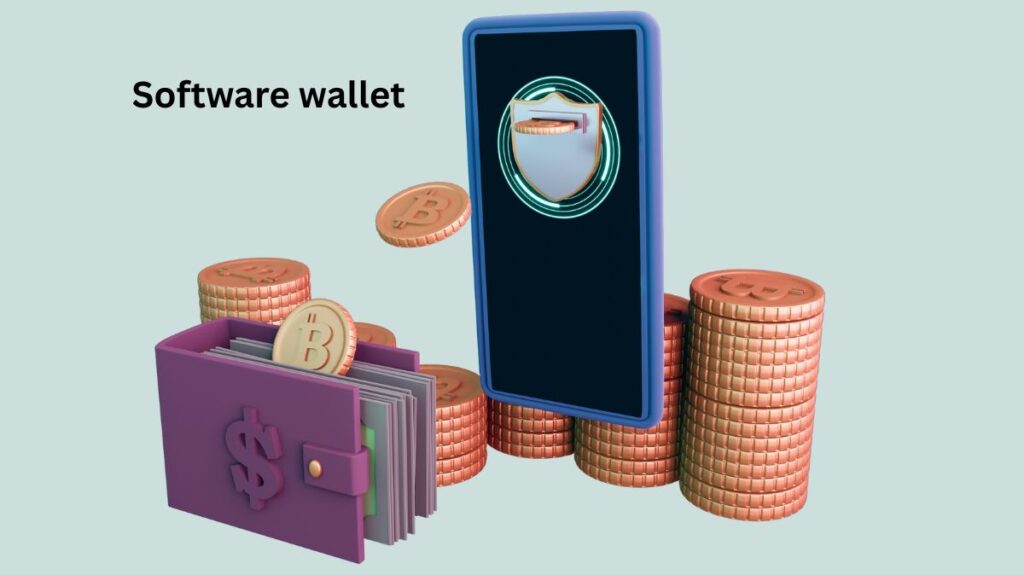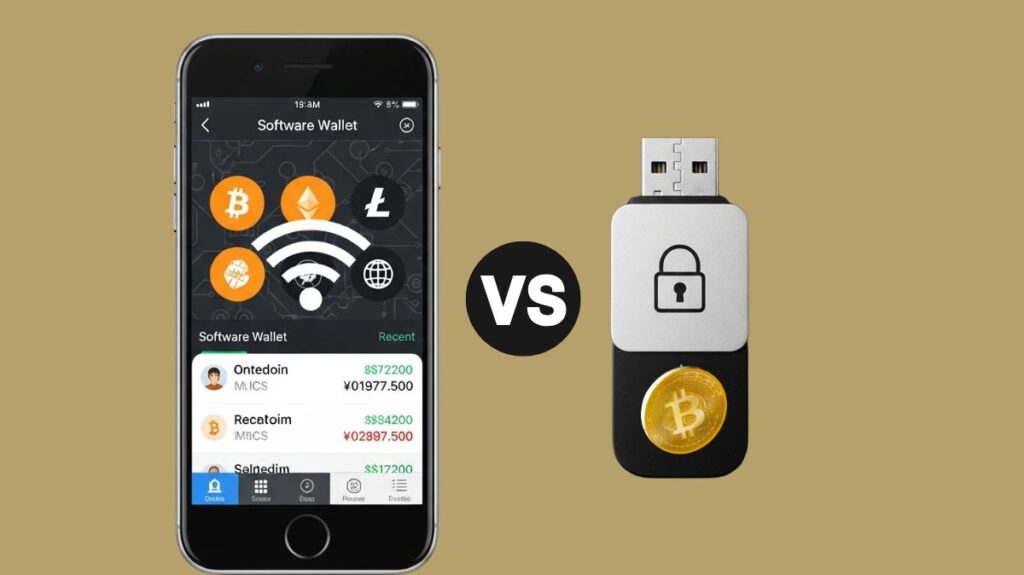What is software wallet?

One kind of cryptocurrency wallet is a software wallet, which is an application or program that is installed on a computer, smartphone, or tablet. It serves as your cryptocurrency’s virtual safe or bank account. It provides the interface that lets you access your cryptocurrency and saves the passkeys you use to sign transactions, rather than storing actual objects. These wallets are typically referred to as “hot wallets” due to the fact that their cryptographic keys are easily accessible for generating transactions due to their direct or indirect internet connections.
Also Read About Types Of Blockchain Wallets: Hot, Cold, Hardware And More
How Software Wallets Work?
It is not possible to physically “store” cryptocurrency in software wallets. Rather, cryptocurrencies are fragments of information dispersed over the blockchain network in a database. Using the app’s UI, the wallet locates every bit linked to your public address and calculates the total for you.
Below is a summary of how they work:
Key Storage
Your private keys, public keys, and related addresses are mostly kept in a software wallet. The 256-bit private key, which is used to digitally sign transactions and establish ownership of digital assets, is a randomly selected number that needs to be kept confidential. Addresses are brief alphanumeric sequences that are obtained from the public key and used to receive funds. The public key is mathematically derived from the private key.
Transaction Management
The wallet broadcasts the transaction to the blockchain network after using your private key to sign it when you send cryptocurrency. The network processes the transaction after confirming the signature. It’s considerably simpler to receive cryptocurrencies when the sender enters your address and you accept the money. By automating a large portion of the laborious manual process of entering lengthy keys that was necessary when cryptocurrencies were initially launched, modern software wallets make the blockchain accessible.
Recovery Seed Phrases
A 12-word (or 24-character alphanumeric key) mnemonic seed phrase is generated by the majority of contemporary wallets and is associated with your keys. If the device is misplaced or broken, this phrase can be used to recover the wallet.
Also Read About What Are The Different Types Of Blockchains Technology?
Types of Software Wallets
Software wallets are divided into groups according to how they are implemented and connected:
Desktop wallets
- These are programs (like Windows, macOS, and Linux) that are installed straight onto the hard drive of your computer. Your computer stores private keys locally.
- Advantages: They provide complete control over your private keys and strike a nice mix between security and ease of use for daily use. They can provide features like encryption and offline transaction signatures.
- Cons: They are susceptible to phishing attempts, malware, and viruses that corrupt your machine. Data from wallets must be regularly backed up. If the computer is broken, money may be lost.
- Examples include Bitcoin Core, Exodus, and Electrum. Electrum is especially well-known for Bitcoin.
Mobile wallets
- These are apps made specifically for iOS and Android smartphones and tablets. They make transactions convenient when you’re on the run.
- Advantages: Very practical for regular purchases and speedy transfers. For simple transactions, several allow scanning QR codes. Along with features like Touch ID and Face ID integration, they are portable.
- Cons: If your smartphone is compromised, you run the risk of losing your phone, having it stolen, or contracting malware. For significant assets, they are thought to be less safe than PC wallets.
- Examples include Mycelium, Edge, Coin98, LETH, Unocoin, MetaMask Mobile, Coinbase Wallet (non-custodial version), and Trust Wallet.
Online wallets, or web wallets
- These wallets, which can be custodial or non-custodial, can be accessed via a web browser.
- Custodial Web Wallets: A third-party business, such a cryptocurrency exchange, is in possession of your private keys.
- Advantages: Frequently integrated with trading platforms, very user-friendly, and eliminates the necessity for private key management.
- Cons: You have to trust the third party; you don’t have complete control over your money. If the exchange is hacked or falls bankrupt, there is a significant danger. For example, your custodial cryptocurrency holdings may be viewed as general unsecured creditors in the event that a custodial provider, such as Coinbase, files for bankruptcy, which could result in a loss of money.
- Binance, Coinbase (exchange account), Kraken, and Blockchain.com wallets are a few examples (although Blockchain.com also offers a non-custodial option).
Non-Custodial Web Wallets
- Usually via a browser extension, you maintain control over your private keys.
- Advantages: Since you own your keys, it’s safer than custodial web wallets. useful for communicating with decentralized apps (dApps).
- Cons: They are susceptible to browser-based attacks because they are still online.
- Examples are Phantom and MetaMask.
Important Software Wallet Features
- Digital: No tangible equipment is needed.
- User-friendly: Made to be simple to set up and operate, frequently with user-friendly interfaces.
- Multi-currency Support: A lot of them can support a lot of assets and store keys for several cryptocurrencies.
- Cost-effective: The majority can be downloaded and used for free.
- Options for backup and recovery: usually contain a recovery seed phrase.
- Other features include portfolio tracking, staking, swapping, and exchange integration.
- DApp Interaction: Crucial for communicating with Decentralized Applications (DApps) and smart contracts, acting as the user’s identification and authentication.
Advantages of Software Wallets
- Convenience and Accessibility: Funds are accessible from a variety of devices, and the system is simple to set up and use for speedy transactions.
- User-friendly: Frequently have user-friendly interfaces that make them appropriate for novices.
- Cost-effective: The majority of software wallets may be downloaded and used for free.
- dApp Interaction: To communicate with dApps and DeFi protocols, non-custodial online wallets are necessary.
Disadvantages and Security Risks
Compared to cold storage methods, software wallets are intrinsically more vulnerable to online threats because they are connected to the internet.
- Online dangers: susceptible to viruses, malware, and phishing scams that steal private keys.
- Hacking: If the servers of the wallet provider are compromised, custodial wallets are at serious risk.
- User error: Since it is computationally impossible to rebuild the private key, losing your seed phrase or private key results in a permanent loss of funds.
- Single Point of Failure: Without a suitable backup, your money may be lost if your device is misplaced, stolen, or broken.
- Malware Disguises: Malware masquerading as wallets has been observed on numerous occasions.
Considerations for Software Wallet Security
In order to reduce hazards, careful security procedures are essential:
- Turn on two-factor authentication (2FA), particularly for web wallets or exchange-based wallets.
- Use secure, one-of-a-kind passwords for any wallet that needs them.
- Safely backup your seed phrase or private key by writing it down and keeping it in a safe or deposit box, or another safe that is offline. Never distribute it or store it digitally.
- Be Aware of Phishing: Verify sender names and URLs frequently.
- Maintain Software Updates: To fix security flaws, update your operating system and wallet software on a regular basis.
- Select wallets with a solid security record and positive community evaluations by using a reputable wallet provider. If at all possible, go for open-source wallets that offer total privacy.
- Think About a Hardware Wallet for Big Holdings: A cold wallet provides better protection for sizable cryptocurrency holdings.
- When using public Wi-Fi to access web wallets, use a VPN.
- Don’t keep a lot of money in one software wallet.
Ideal Use Case
For small to medium quantities of cryptocurrency that need to be accessed quickly, software wallets are perfect. They work well for frequent users or traders who are active in the market.
Hardware wallet vs Software wallet

The main distinction is that a hardware wallet is a physical device that keeps private keys offline, away from internet dangers, whereas a software wallet saves private keys on a device that is connected to the internet. In general, hardware wallets provide a higher degree of security.
| Feature | Software Wallet | Hardware Wallet |
|---|---|---|
| Definition | Digital application for storing crypto keys | Physical device for storing crypto keys |
| Security Level | Moderate (vulnerable to malware) | High (offline storage, immune to online hacks) |
| Internet Connection | Requires internet (hot wallet) | Does not need internet (cold wallet) |
| Ease of Use | Very easy and convenient | Requires setup and sometimes more steps |
| Examples | MetaMask, Trust Wallet, Coinbase Wallet | Ledger Nano S/X, Trezor, KeepKey |
| Cost | Usually free | Costs $50–$200+ |
| Backup & Recovery | Seed phrase or cloud backup | Seed phrase (must be stored securely) |
| Risk of Loss | Risk if device is hacked | Risk if physical wallet is lost or damaged |
| Best For | Beginners and everyday users | Long-term holders and high-value storage |
